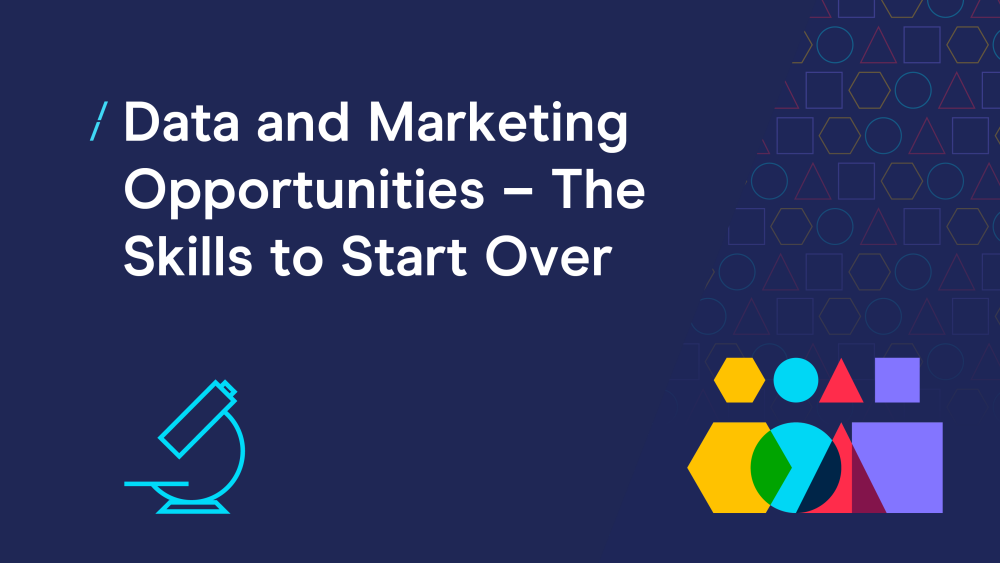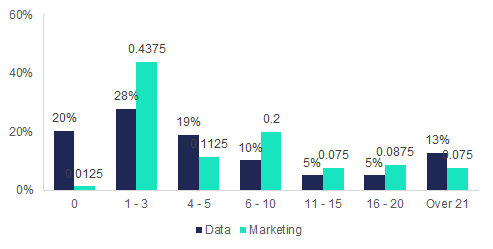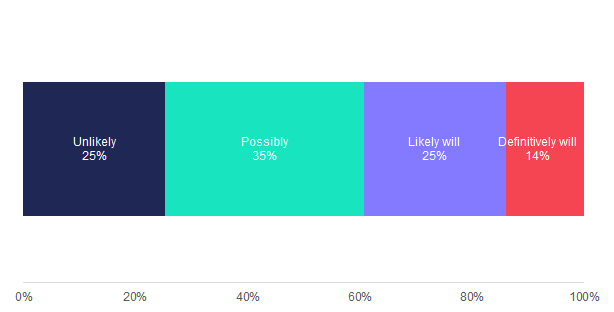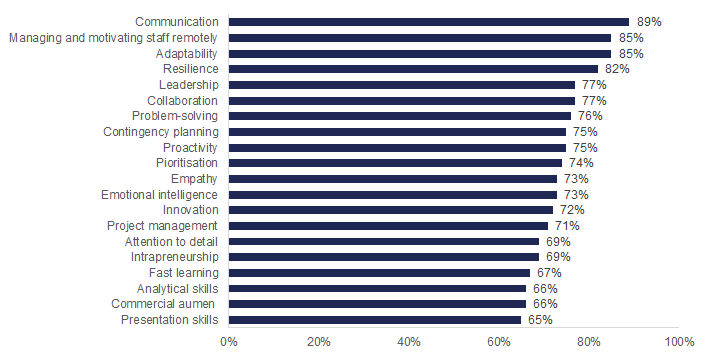Data and Marketing Opportunities - The Skills to Start Over
25 May 2021

It’s no mystery that the fragile nature of the economic recovery post-pandemic might bring a sharp increase in both redundancies and hiring freeze. Especially when the furlough scheme comes to its expected end in October 2021, we might experience what is defined as the unemployment scarring effect.
Decades of research has explored the ‘scarring’ effect of youth unemployment – living without work is harmful to one’s health. Unemployment not only affects one’s income and career, but also impacts wellbeing and stress, affecting both physical and mental health. Consequently, as in a vicious circle, due to the struggles with body and mind, the individual will have fewer chances to look for new opportunities and being seen for his/her potential.
The uncertainties that surround us all have had (and are still having) a strong impact on the current and future opportunities we can offer as an industry. What does the recruitment landscape look like for data and marketing roles? What will it look like in a year time?
These are the two main questions we want to address within this article, as well as shed light on what the industry can do to turn the corner. Indeed, the answer seems to be in the skills that both employees and candidates need to have in mind when either offering or looking for new opportunities.
Current opportunities
According to a recent survey of UK marketers conducted by the DMA, two out of five businesses (41%) are currently recruiting for data or marketing roles. In particular, among those who said they are offering job opportunities in these fields, 45% work for a large business, 29% for a medium-sized enterprise and 25% for either a macro or a small company.
However, a similar proportion (45%) don’t have any opportunities available for those keen to find new data or marketing roles. This is especially true for micro and small businesses, which constitute 60% of the total number of organisations that aren’t currently recruiting for such roles.
Finally, 14% admitted being unfamiliar with the current recruitment strategy of their business.
Is your organisation currently recruiting for any data and/or marketing roles?

When asked how many roles businesses are currently recruiting for, businesses reported an average of nine opportunities (9.47) for jobs in the data field and seven (7.22) for those in the marketing field.
Almost half of the businesses are offering one to five roles in data (47%) and 13% are currently recruiting for more than 21 roles – this seems to be especially true in London and North West areas.
On the other hand, one to three roles (44%) are offered in the marketing field and an additional 20% of businesses said they are recruiting for six to ten roles – this seems to specifically apply to agencies (63%).
How many data and marketing roles are currently being recruited for within your organisation?

Future Opportunities
About one in four businesses (39%) thinks it will recruit for data and marketing roles for the year ahead – 14% said they will definitely hire in these areas. In particular, medium-sized businesses sounded more positive than other businesses about future hiring, constituting more than half (54%) of the group of businesses who will definitely offer data and marketing job opportunities in the future. The majority of large businesses (49%) have positioned themselves as slightly less sure, but still with a positive perspective.
However, at the same time, 35% said they will possibly offer data and marketing job opportunities and 25% said they won’t. Such a negative future perspective seems to be especially true for micro and small businesses (70%).
How likely is your organisation to recruit for any data and marketing roles in the next 12 months?

The keystone to turn the pandemic corner
Skills. This is where the industry, employers and candidates should look to start over.
As the International Labour Organization (ILO)’s guidelines illustrate, skills development can lessen the impact of the pandemic – it builds resilience of workers and organisations while the pandemic is still active, and it prepares for recovery. Investing in skills has a central role to get those most affected by the pandemic back into productive and stable jobs, avoiding long-term economic and career scarring.
Such investment won’t only have a positive effect on those looking for a fresh start, but it will also support those who already contribute to the organisation’s success.
Undervaluing the importance of offering a clear and consistent skills development plan may hinder the business ability to reach its full productivity and profitability.
Indeed, as highlighted in the Department for Education’s (DfE) most recent Employer Skills Survey (ESS), alongside skill shortages that may be experienced when recruiting, employers may also face skills gaps in their existing workforce.
But what skills?
There are three skills that are most in-demand for the data and marketing industry in 2021, according to research by Michael Page:
1. Effective communication
Remote working and strong use of technology to communicate are now part of what we define as ‘the new normal’. Subsequently, marketers had to learn and adapt to new channels to collaborate with their teams and stakeholders to work on campaigns and projects.
However, we see a clear silver lining in the raising presence of WFH opportunities.
On one hand, candidates have access to a wider list of job opportunities, even those geographically inaccessible, as distances are erased by the support of technology to interact with both colleagues and clients. On the other hand, employers can reach not only a more extended but also new and different talent pools – a great way to also improve the talent diversity within organisations as we saw in our latest report on apprenticeships.
2. Digital skills
Due to the pandemic restrictions, 2020’s marketing campaigns have almost entirely shifted to digital. With businesses and customers using online as primary channels, organisations need more specialist digital skillsets to ensure information and products are kept effective and up to date.
As highlighted in the ESS, specific digital skills are key to unlocking opportunities for those looking for a fresh start. Indeed, having the right digital skills is not only essential for employers, but it also has significant benefits for workers.
In 2019, after the analysis of millions of online job adverts in the UK, the Department for Digital, Culture, Media and Sport (DCMS) commissioned a report able to provide an overview of the digital skills request and ultimately inform the development of evidence-based digital skills policy.
In particular, Michael Page, after interviewing 500 business leaders, has identified the top 20 emerging skills that will be key in 2021. The percentages reported in the following chart represent the proportion of business leaders who said that specific skill will be more important in 2021 than it was in 2020.
Most in-demand skills in marketing and digital 2021

3. Insights and analysis
2020 has determined important changes in the role of marketing professionals within businesses - adapting and evolving to meet changing consumer’s demands has been key for businesses.
Indeed, during the last year, understanding customers’ needs to better target and engage with the right audience has become more important than ever.
Nowadays, most organisations’ decisions are driven by data and insights - especially when a brand correctly places its customers at the heart of everything the business does.
All the changes brought by the pandemic have affected the way customers are interacting with brands resulting in a greater demand for insight and data into digital consumer behaviours.
Therefore, it is clear that attracting and securing top talent in data and insight will be crucial for all businesses’ future.
Where should you start?
Here a few win-win solutions for both businesses and talent:
- Apprenticeships and our latest report that explains how this recruiting strategy can support you in building a skilled and committed workforce
- DfE Skills bootcamps: Skills bootcamps offer free, flexible courses of just 12 to 16 weeks for adults aged 19 or over and who are either in work or recently unemployed
- Traineeship : A traineeship is a course with work experience that allows the individual to be ready for work or an apprenticeship. It can last from 6 weeks up to 1 year, available to those aged 16 to 24 and qualified up to and including Level 3 (equivalent to A Level)
- Kickstart Scheme: The Kickstart Scheme provides funding to create new jobs for 16 to 24 year olds on Universal Credit who are at risk of long term unemployment
Please login to comment.
Comments